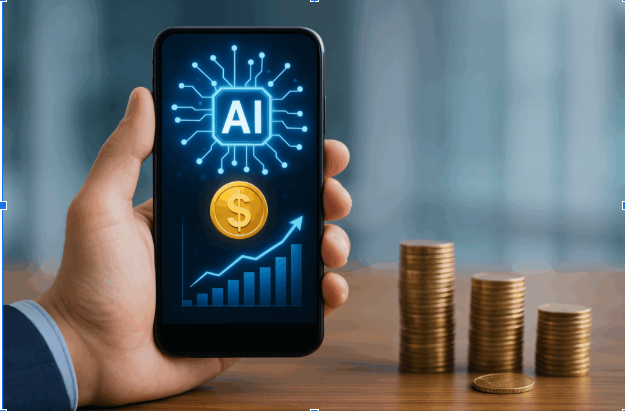Artificial intelligence (AI) has become an integral part of the mobile app ecosystem, redefining how users interact with technology and how businesses generate revenue. In a world where personalization and convenience shape user experiences, integrating AI into mobile apps is no longer a luxury, it’s a necessity. From intelligent chatbots and recommendation systems to predictive analytics and automated services, AI-driven apps are leading innovation in every industry. However, the question that often follows technological advancement is how to effectively monetize these innovations. For businesses and an AI development company looking to leverage AI in mobile apps, understanding monetization strategies such as freemium models, personalization, and premium features is crucial for sustainable success.
The Freemium Model: Driving Engagement through Accessibility
The freemium model has become a dominant strategy for mobile apps, particularly those leveraging AI technologies. This approach allows users to access the basic version of an app for free while offering advanced features or additional functionality through paid upgrades. The underlying philosophy of the freemium model is to attract a large user base initially, build engagement, and then convert a percentage of users into paying customers.
AI plays a critical role in optimizing this model by analyzing user behavior and determining when and how to introduce premium offerings. For instance, AI algorithms can study user interactions, detect engagement patterns, and predict which users are most likely to convert to paid versions. This predictive capability helps developers fine-tune pricing strategies and promotional timing, resulting in higher conversion rates.
Moreover, AI-driven freemium apps can automate onboarding experiences to make users feel more comfortable navigating the free version. AI-powered tutorials or chatbots can provide personalized guidance, making users more likely to appreciate the value of advanced features. As a result, the freemium model becomes not only a means of user acquisition but also a tool for long-term retention.
Personalization: Enhancing Value and Encouraging Spending
Personalization is one of the most powerful ways to monetize AI in mobile apps. Today’s users expect applications to understand their preferences and anticipate their needs. AI enables apps to deliver hyper-personalized experiences by analyzing data such as browsing behavior, purchase history, and even contextual factors like location or time of day.
For instance, in a music streaming app, AI can recommend playlists based on the listener’s mood and habits. In e-commerce apps, machine learning models can display products that align with individual tastes, increasing the likelihood of purchase. By making users feel understood and catered to, personalization fosters loyalty and enhances the perceived value of premium features.
Furthermore, personalization enables developers to introduce targeted upselling opportunities. Rather than presenting the same upgrade option to every user, AI can tailor premium offerings based on what each user values most. This approach minimizes friction in the buying process and increases conversion rates. Businesses that hire AI developers in India to design and implement such intelligent personalization systems can achieve deeper engagement and higher lifetime customer value.
Beyond recommendations, AI also enhances dynamic pricing. By analyzing market trends and user demand, AI can adjust pricing structures in real time. This ensures that premium features remain competitively priced while maximizing profitability. Additionally, personalization improves user satisfaction, which translates to positive reviews and organic growth further strengthening monetization outcomes.
Premium Features: Elevating User Experience for Revenue Growth
While the freemium model and personalization help attract and retain users, premium features form the foundation of monetization. These features are typically reserved for paying customers and are designed to offer tangible value that free users cannot access. In AI-powered apps, premium features often include advanced analytics, predictive insights, automation tools, and enhanced user interfaces.
For example, in fitness apps, AI can analyze user activity data to generate customized workout plans or provide predictive health insights. Such exclusive functionalities encourage users to upgrade, particularly when they see measurable benefits. Similarly, in productivity apps, AI can automate repetitive tasks, manage schedules intelligently, and integrate with other services seamlessly that justify premium pricing.
The success of premium features lies in demonstrating their superiority over free options. AI aids this process through adaptive user experiences. It can identify the most engaged users and offer time-limited access to premium tools, allowing them to experience added value before making a purchase decision. This “try-before-you-buy” approach, powered by AI insights, often leads to higher conversions and reduced churn.
Additionally, premium features can be monetized through subscription-based models. Subscriptions provide a steady revenue stream and allow continuous improvements based on user feedback. AI can analyze usage data to refine premium offerings and introduce new features that align with evolving user preferences. This creates a cycle of value generation: users receive improved services, and businesses enjoy sustained profitability.
AI-Driven Advertising and Data Monetization
Another layer of monetization comes from AI-enhanced advertising. Traditional in-app ads can be intrusive and reduce user satisfaction, but AI transforms this landscape through smarter, context-aware advertising. Machine learning algorithms analyze user interests and display relevant ads, resulting in better engagement and higher click-through rates.
Moreover, AI can determine the optimal moments to show ads without disrupting the user experience. This ensures that advertisements feel organic and add value rather than annoyance. For example, a travel app could show flight or hotel promotions right after a user searches for destinations, improving ad relevance and potential revenue.
Data monetization also benefits from AI’s analytical capabilities. By aggregating anonymized user data, apps can uncover valuable market insights that may be sold to third-party companies for research and strategic development. While this must always adhere to privacy regulations, AI’s ability to ensure compliance and protect sensitive information makes it a powerful tool for ethical data monetization.
Challenges and Ethical Considerations
Despite its immense potential, monetizing AI in mobile apps comes with challenges. Data privacy is a primary concern, as personalization and predictive analytics rely on user data. Businesses must be transparent about data collection practices and comply with privacy laws such as GDPR and CCPA. Users are increasingly aware of data rights, and trust plays a vital role in their willingness to engage with premium services.
Another challenge lies in balancing monetization with user experience. Overemphasizing upselling or showing excessive ads can alienate users. Therefore, developers must use AI not just for profit but for enhancing satisfaction and trust. Additionally, the high cost of AI integration can be a barrier for smaller companies. However, scalable AI frameworks and cloud-based machine learning platforms are making it increasingly accessible, enabling even startups to compete effectively.
Conclusion
Monetizing AI in mobile apps requires a balance between innovation, user experience, and ethical responsibility. The freemium model serves as an entry point, personalization deepens engagement, and premium features drive sustainable revenue. Together, these strategies form a powerful ecosystem where AI fuels both functionality and profitability.
As businesses continue to integrate intelligent systems into their mobile platforms, those that focus on delivering personalized value while respecting user trust will emerge as industry leaders. Partnering with experienced teams to hire mobile app developers skilled in AI integration can help companies design smarter, more adaptive solutions that resonate with users.
The era of AI-powered monetization is not just about technology, it’s about transforming digital interactions into meaningful, rewarding experiences for both users and businesses alike.




Leave a Reply